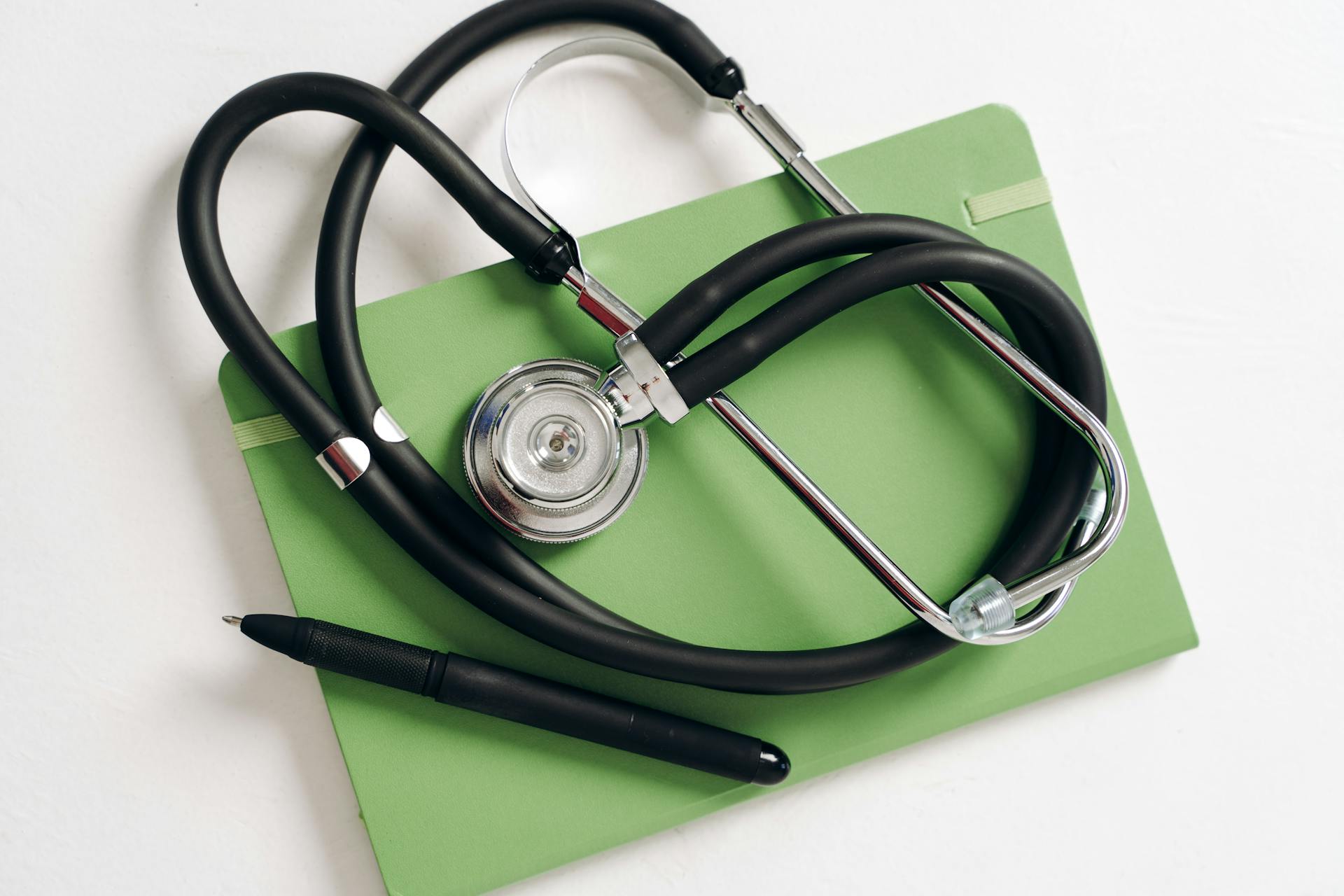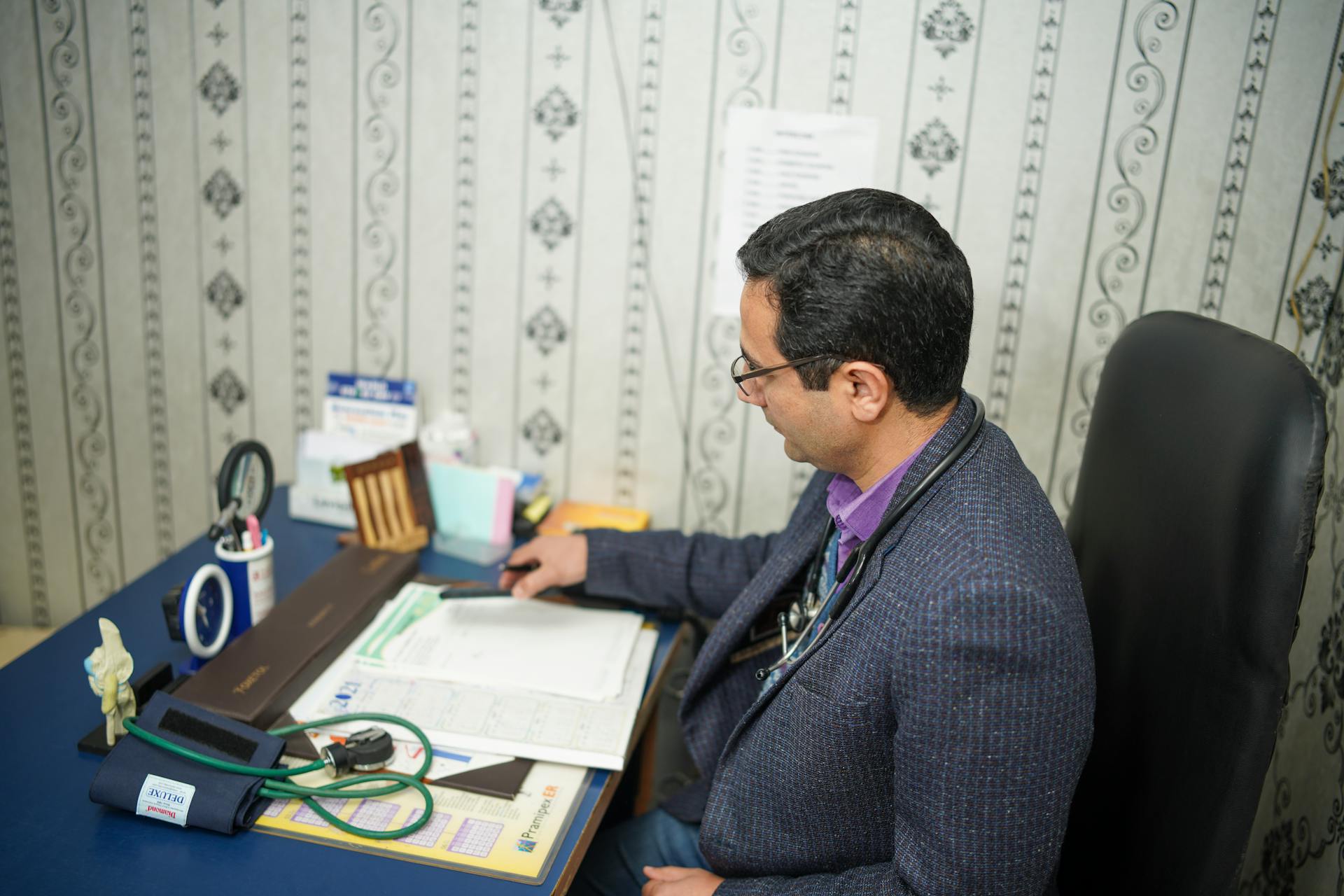
To ensure secure and reliable transactions, it's essential to follow HIPAA compliant billing best practices. This means implementing measures to protect sensitive patient information.
One key aspect is to use secure communication channels, such as encrypted email or secure messaging platforms, to transmit billing information. This helps prevent unauthorized access to patient data.
To further protect patient information, consider using tokenization, which replaces sensitive data with a unique identifier, making it unreadable to unauthorized parties. This adds an extra layer of security to your billing process.
In addition to secure communication and tokenization, it's also crucial to implement robust access controls, such as user authentication and authorization, to limit who can access billing information. This helps prevent data breaches and ensures only authorized personnel can view patient data.
Readers also liked: Hipaa Why Is It Important
Privacy of Patients
HIPAA compliant billing is all about protecting patient privacy. HIPAA establishes strict guidelines to safeguard patient information, including maintaining the confidentiality of medical records and billing information.
A fresh viewpoint: Billing Information Is Protected under Hipaa

To ensure patient privacy, medical billing software must be HIPAA compliant. This means implementing measures to prevent unauthorized access, use, or disclosure of patient information.
Here are some key features of HIPAA compliant medical billing software:
- Maintains patient confidentiality
- Prevents unauthorized access to patient information
- Ensures the integrity and security of patient data
- Includes access controls, encryption, staff training, and audits
HIPAA compliant medical billing software requires healthcare providers to notify patients about their privacy practices. This includes a document explaining how the provider uses and protects patient information, as well as the patient's rights regarding their information. Patients must provide written consent for releasing their PHI, except in cases where the information is required for treatment, payment, or healthcare operations.
Security Measures
To ensure the security of patient information, HIPAA-compliant billing software sets specific standards to protect electronic PHI (ePHI) and data from unauthorized access, use, or disclosure.
Implementing administrative, physical, and technical protection is a necessity for healthcare organizations to maintain the integrity and security of patient information. This includes access controls, encryption, staff training, and audits.
A different take: Hipaa Access Control

HIPAA Security Rule states that all healthcare organizations and partners must ensure the confidentiality, accessibility, and security of PHI. This involves specific rules for medical billing compliance with Administrative, Physical, and Technical Safeguards.
To protect physical access to areas where PHI is stored, physical security measures should be in place. This can be done by restricting access to data centers, secure storage of paper records, and proper disposal of physical media.
HIPAA-compliant medical billing software should include technical safeguards, such as strong access controls, unique user IDs and passwords, encryption of sensitive data, and regularly updating and patching software systems.
Here are some key technical safeguards to consider:
- Unique user IDs and passwords
- Encryption of sensitive data
- Implementing firewalls and intrusion detection systems
- Regularly updating and patching software systems
Data encryption is also crucial, as it applies to data both in transit and at rest. HIPAA provides mandates on the standardization of electronic transactions, which supports security as well as efficiency and error reduction.
Transmission security provides an additional layer of security with its end-to-end encryption (E2EE). E2EE secures both data stored in the medical billing software and data being sent through your medical billing software.
Business associate agreements (BAA) with partners are also required, and companies should have documented policies on HIPAA compliance.
Worth a look: Hipaa Compliant Data Destruction
Data Backup and Recovery Planning
Data backup is crucial for protecting patient data from breaches or natural disasters. It allows for quick restoration of data if the original copies are damaged or stolen.
Regular backups in a separate server are a must-have for medical billing software. This ensures that data is safe and can be restored quickly in case of an emergency.
A disaster recovery plan should be in place to handle incidents related to software. It outlines the steps to take in case of an attack and how to get back online.
Data encryption is also essential for secure data transmission. HIPAA mandates encryption for data both in transit and at rest.
A disaster recovery plan should include how to investigate breaches and communicate the incident to the OCR and patients. Practice and update the plan regularly to ensure it's effective.
Data backup and disaster recovery planning are essential components of HIPAA compliance. They help protect patient data and ensure business continuity in case of an emergency.
Suggestion: Hipaa Compliance Plan
User Authentication

User authentication is a crucial aspect of HIPAA compliance. It ensures that users are who they appear to be while using the unique login credentials.
To achieve this, HIPAA-compliant medical billing software must have a means to provide unique login credentials for each user within the organization. Multi factor authentication (MFA) is a form of user authentication which offers increased security.
MFA requires users to input multiple login credentials to access data such as a username and password. This adds an extra layer of protection to prevent unauthorized access.
By implementing user authentication, healthcare organizations can minimize the risk of data breaches and ensure the confidentiality, integrity, and availability of protected health information (PHI).
Take a look at this: Hipaa Data Governance
Transmission and Payment
Square is the only online payment processor clearly and definitively HIPAA compliant.
Having a secure and fast option for transferring Protected Health Information (PHI) and payment-related records is essential to avoid future difficulties.
Podium Payments offers cutting-edge solutions for PHI and asks organizations to have a Business Associate Agreement (BAA) to stay compliant with HIPAA regulations.
ACH payments are a secure and cost-effective way to handle transactions, especially recurring payments like monthly memberships or installment plans.
ACH transactions can take several days to process, which may delay payment receipt, and are not suitable for one-time payments or when immediate transaction confirmation is required.
Suggestion: Hipaa Compliant Payments
Electronic Transactions and Code Sets

Standardized electronic transactions and code sets are a must for HIPAA-compliant medical billing. This ensures consistent formats and codes are used by healthcare providers while submitting and processing claims electronically.
Standardization simplifies the billing process, enhances efficiency, and reduces errors in the long run. Electronic transactions and code sets are mandated by HIPAA compliance.
Healthcare providers must use standardized electronic transactions and code sets in medical billing to avoid future difficulties. This standardization will make sure that consistent formats and codes are used by healthcare providers while submitting and processing claims electronically.
Standardization ensures a simplified billing process, enhances efficiency, and reduces errors in the long run.
A unique perspective: Why Is Hipaa Important for Billing and Coding
Traditional Financial Institutions: Are You?
Traditional financial institutions often offer more than just basic banking services. They may provide investment, insurance, billing, and collection services.
Many "old school" banks now offer these additional services, which can make them more like business associates. If they generate bills or receipts that contain patient protected health information, they must be HIPAA compliant.

The question to ask is: Does my financial institution use or disclose patient protected health information? If they do, they need to be willing to sign a business associate agreement to be HIPAA compliant.
If you're unsure, it's better to be safe than sorry and ask if they will sign a business associate agreement. If they won't, it may be wise to think about others who will.
Take a look at this: Hipaa Business Continuity
Risk Assessments & Audits
Regular risk assessments and audits are crucial for identifying vulnerabilities and risks to patient information. This involves comprehensively analyzing systems, processes, and physical infrastructure to identify security gaps.
Conducting regular audits helps ensure ongoing compliance and identifies areas that require improvements. Healthcare organizations should undergo regular audits from outside firms to maintain HIPAA compliance.
A HIPAA Security Risk Analysis is a critical component of this process. This analysis helps identify potential security risks and vulnerabilities in your systems and processes.
Readers also liked: Hipaa Security Services

To ensure adherence to the minimum necessary standard, HIPAA requires PHI access to be regularly tracked. This can be done by keeping an audit log, which allows healthcare organizations to establish regular access patterns to PHI.
Regular tracking of PHI access helps administrators detect cases when PHI is being accessed outside the norm. This makes it easier to identify potential security breaches.
Here are the key steps to conduct regular risk assessments and audits:
- Comprehensively analyze systems, processes, and physical infrastructure
- Identify security gaps and take appropriate measures to overcome them
- Conduct regular audits from outside firms to maintain HIPAA compliance
- Keep an audit log to track PHI access and establish regular access patterns
By following these steps, healthcare organizations can ensure ongoing compliance with HIPAA regulations and protect patient information from potential security breaches.
Payment Options and Methods
Having a secure and fast option for transferring protected health information (PHI) and payment-related records is essential to avoid future difficulties.
Podium Payments is one of the ultimate secure and HIPAA-compliant payment processing and transactions for healthcare providers, offering cutting-edge solutions for PHI and requiring business associate agreements (BAAs) to stay compliant.
Allowing providers to communicate with patients via text can improve engagement and reduce no-shows, and payments can be collected directly through text, streamlining the process.
For more insights, see: Hipaa Text

ACH payments are a secure and cost-effective way to handle transactions, especially recurring payments like monthly memberships or installment plans, which are also ACA and HIPAA-compliant Electronic Funds Transfers (EFT).
Typically, ACH transactions have lower fees than credit card transactions, making them cost-effective for recurring payments, and direct bank transfers reduce the risk of fraud and chargebacks.
However, ACH transactions can take several days to process, which may delay payment receipt, and are not suitable for one-time payments or when immediate transaction confirmation is required.
Best Practices and Automation
Having HIPAA compliant medical billing software is essential for medical practices, as it increases efficiency and accuracy of billing and claims processing. It also ensures patient information is kept secure and confidential.
91% of consumers prefer electronic payment methods for medical bills, making it a must for practices to understand the best practices for utilizing this type of software.
Implementing automation in medical claims processing can revolutionize accuracy, directly impacting the financial health of your practice.
Take a look at this: Hipaa Compliant Billing Software
Staff Training

Staff training is crucial to ensure that your staff adheres to HIPAA regulations. Human error is often the cause of HIPAA violations, so it's essential to provide ongoing training and education.
Test your staff on what they learn to ensure they understand the material. This can be done through regular quizzes or exams.
Ongoing training and education can help prevent HIPAA violations. By testing your staff on what they learn, you can be confident that they have a good grasp of HIPAA regulations.
Worth a look: Hipaa Video Training
Best Practices
Having HIPAA compliant medical billing software in place is essential for medical practices of all sizes. It increases efficiency and accuracy of billing and claims processing, and ensures patient information is kept secure and confidential.
91% of consumers prefer electronic payment methods for medical bills, making it crucial to understand the best practices for utilizing this type of software.
To ensure secure and confidential patient information, medical billing software must be designed with security in mind.
Streamlining Claims Management for Better Results

Streamlining claims management is crucial for better results. It directly impacts the financial health of your practice, making accuracy a top priority.
The healthcare industry's shift towards electronic payment methods is a game-changer, with 91% of consumers preferring this option for medical bills. This trend highlights the importance of efficient and accurate claims processing.
A well-structured claims management process can save you time and reduce stress. It's essential to have HIPAA-compliant medical billing software in place to ensure patient information is kept secure and confidential.
Automation is revolutionizing claims processing accuracy, making it an indispensable tool for medical practices. By leveraging automation, you can streamline your claims management process and achieve better results.
Medical claims management is a vital part of the healthcare ecosystem, and streamlining it can make a significant difference in your practice's financial health.
Here's an interesting read: Making a Company Hipaa Compliant
Frequently Asked Questions
Does HIPAA apply to bills?
Yes, HIPAA applies to patient billing information, which is considered Protected Health Information (PHI). This includes details about medical conditions, treatments, and services received.
Which payment app is HIPAA compliant?
SimplePractice offers HIPAA-compliant payment methods with robust security features, including 24/7 monitoring and bank-level EHR security. This HITRUST-certified platform ensures secure transactions for healthcare providers.
Sources
- https://unifymedicraft.com/blog/hipaa-compliant-billing-software-unify-medicraft
- https://compliancy-group.com/are-you-using-hipaa-compliant-billing-software/
- https://www.linkedin.com/pulse/top-10-hipaa-compliant-payment-methods-vmsme
- https://www.simplepractice.com/blog/hipaa-compliant-billing/
- https://www.collaboratemd.com/blog/understanding-the-importance-of-hipaa-compliance-in-medical-billing-software/
Featured Images: pexels.com


